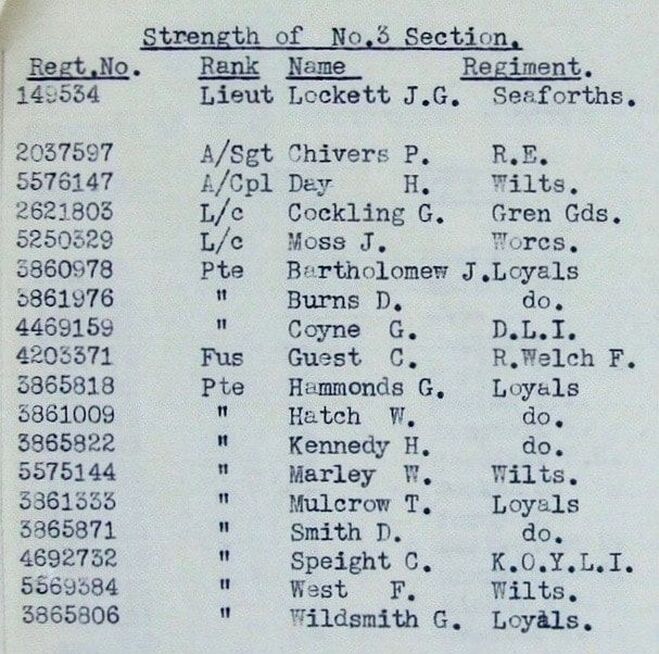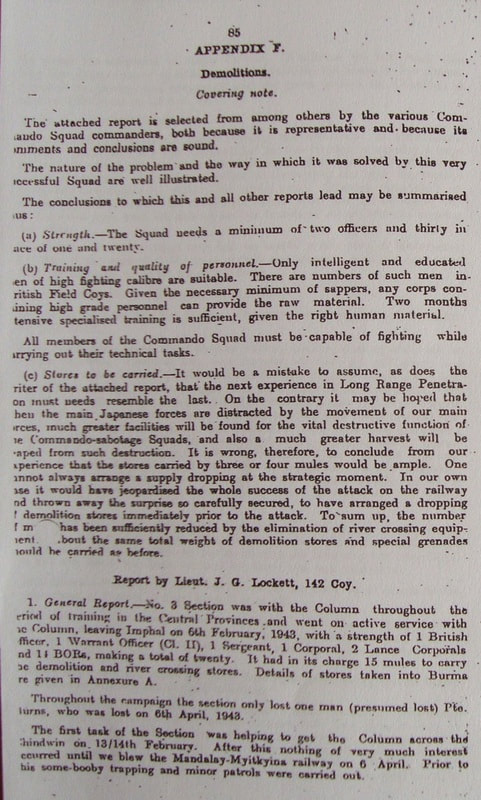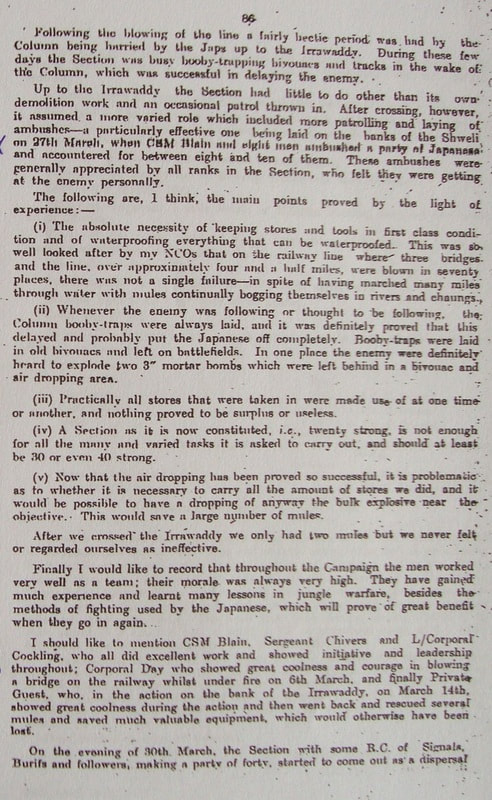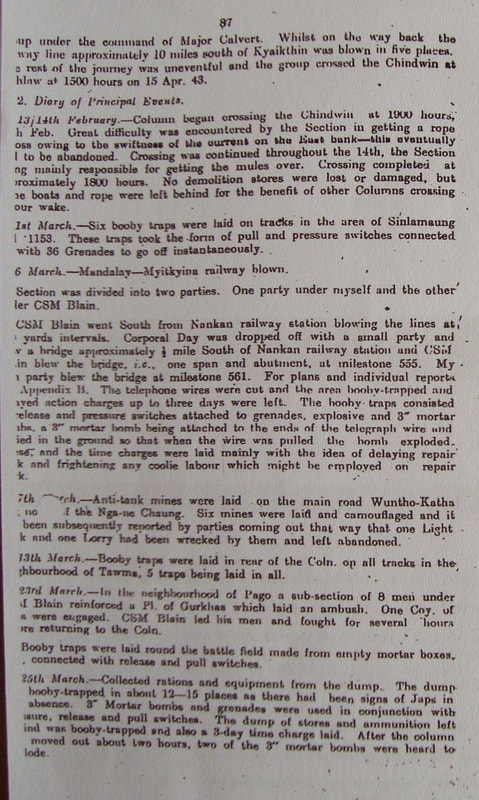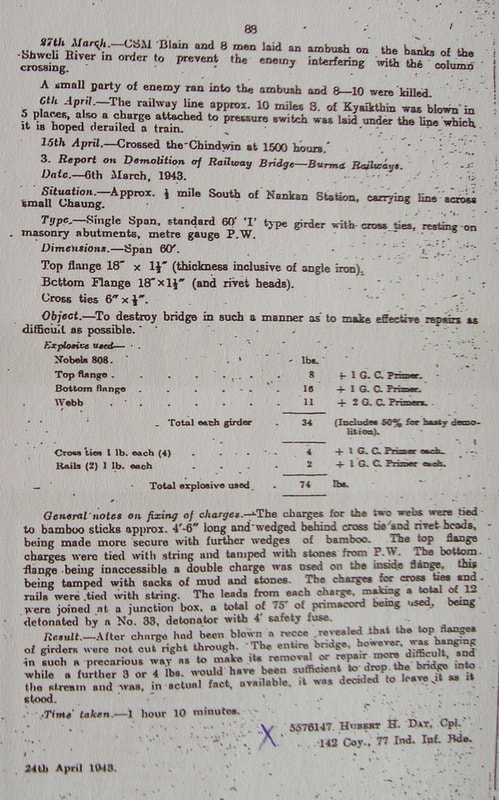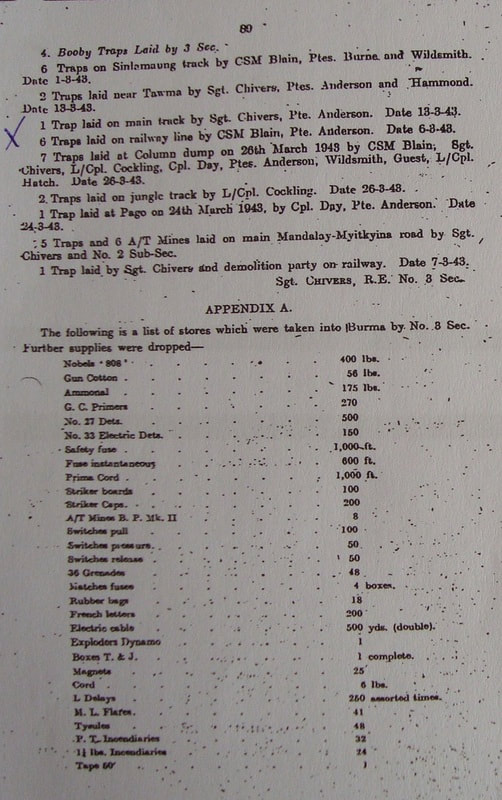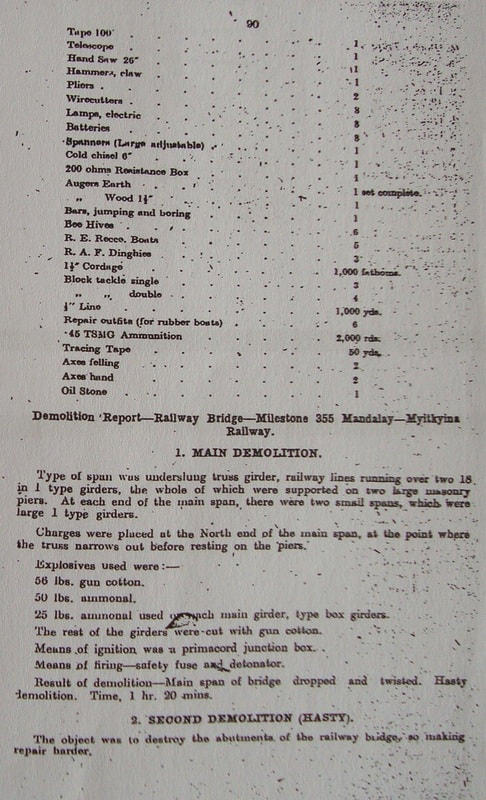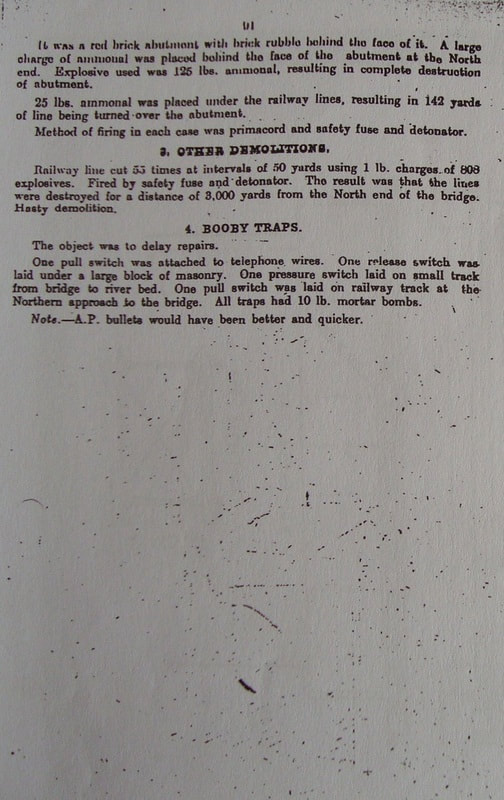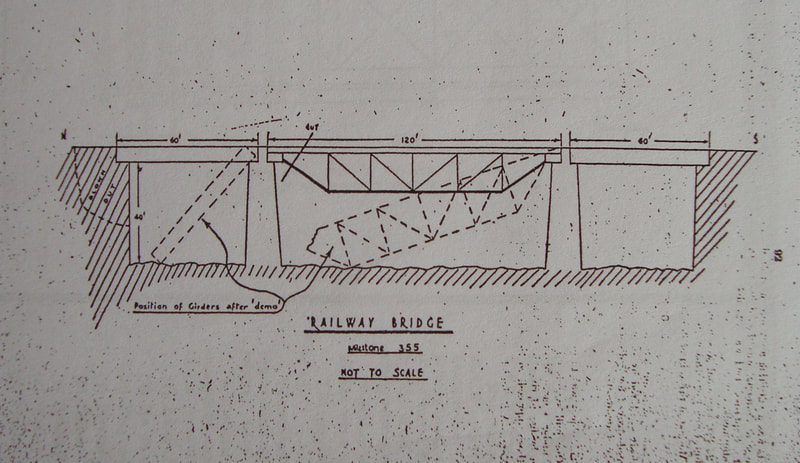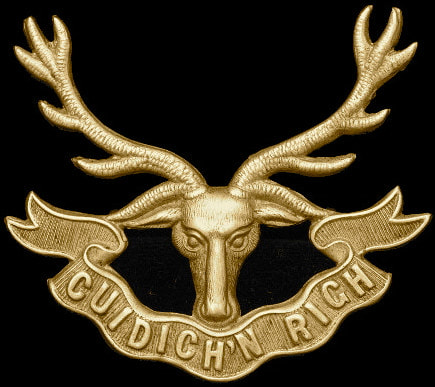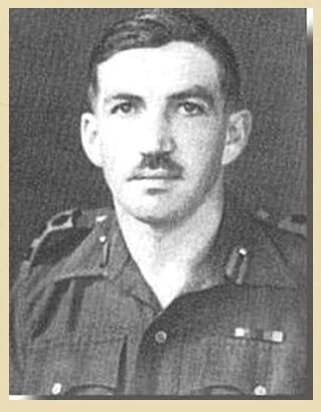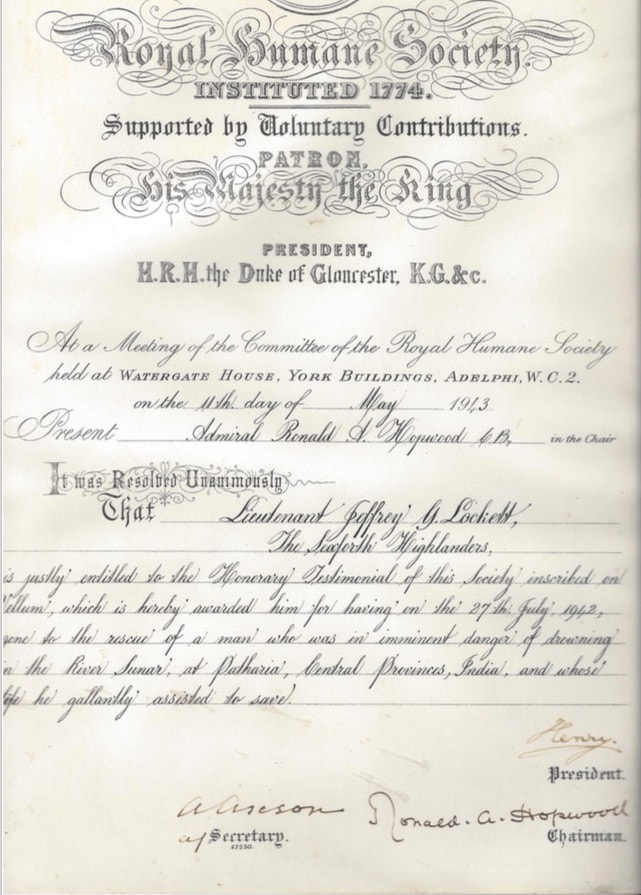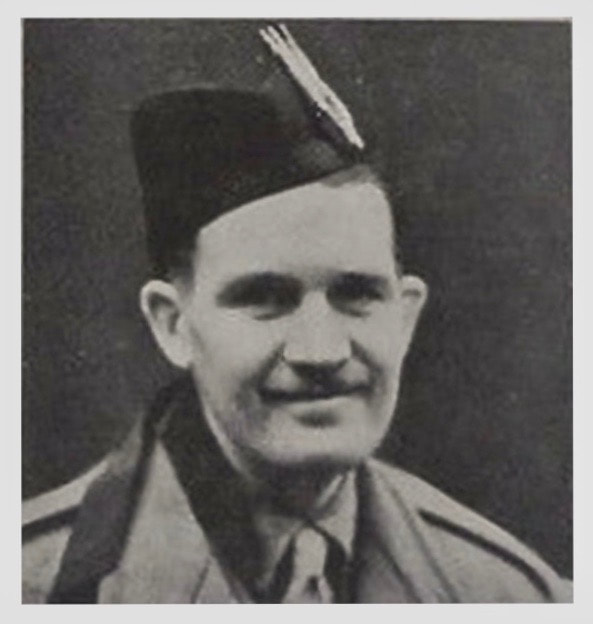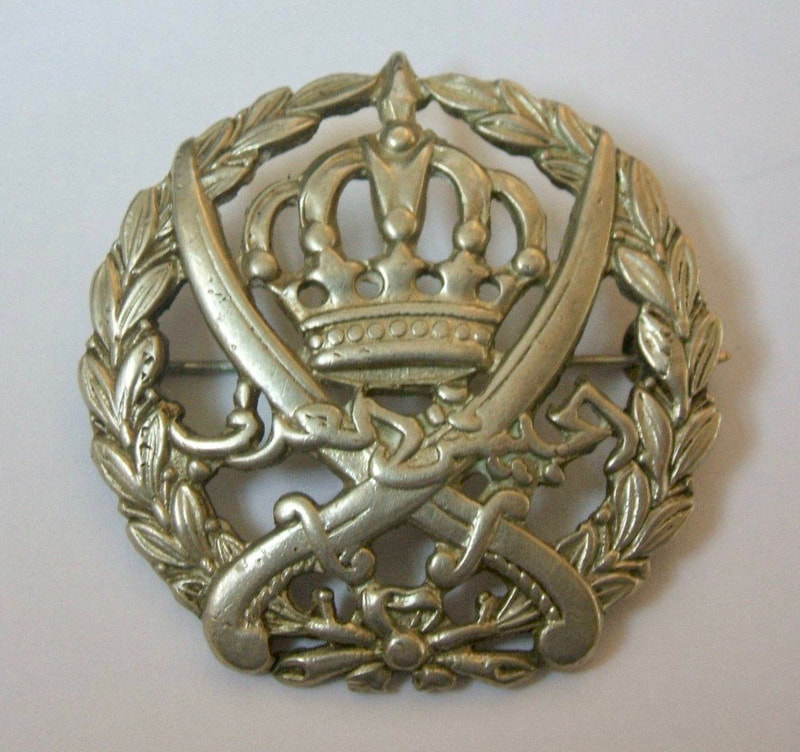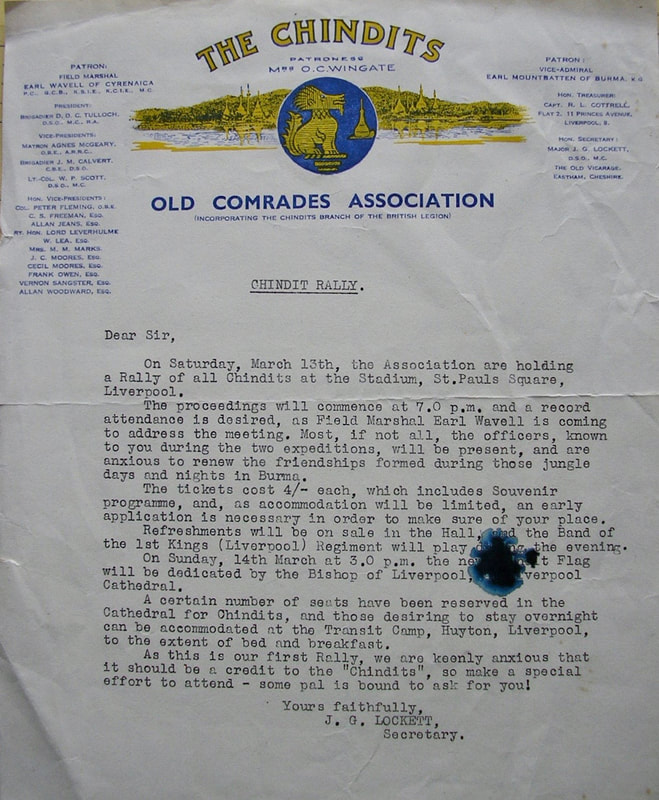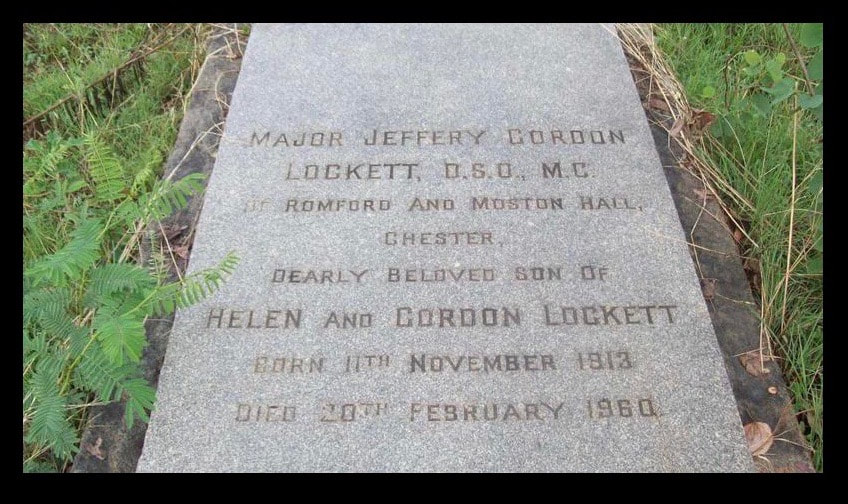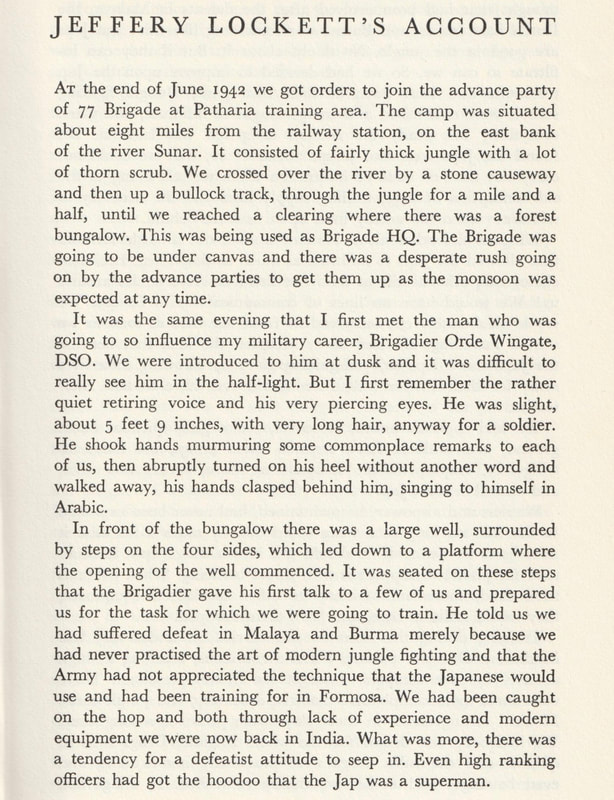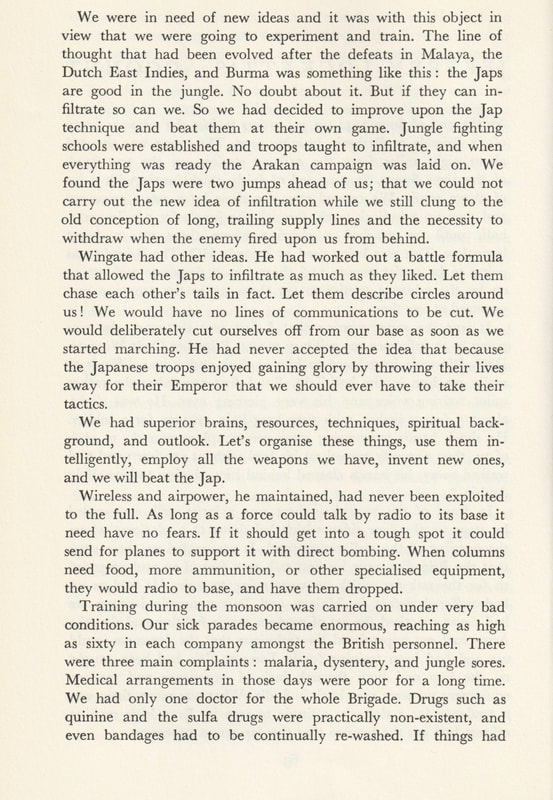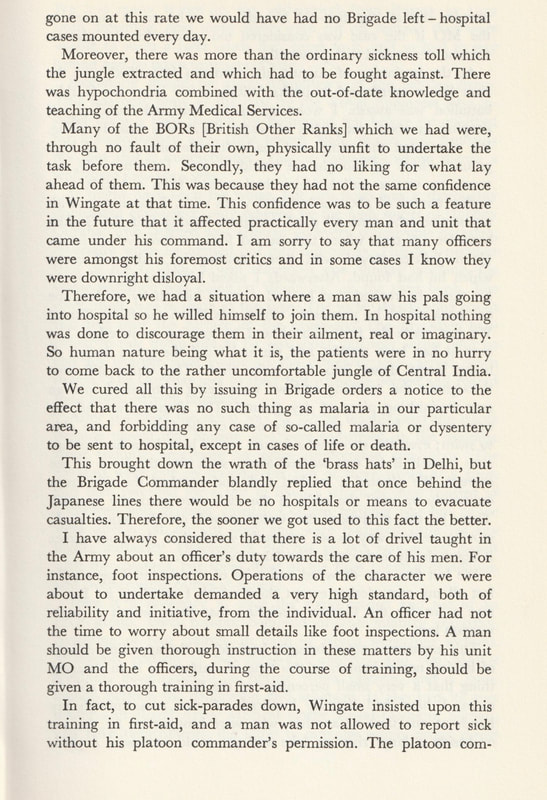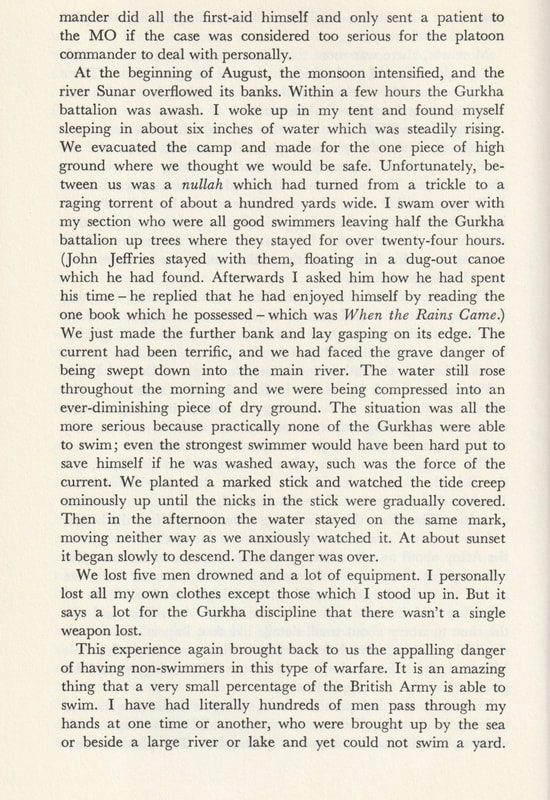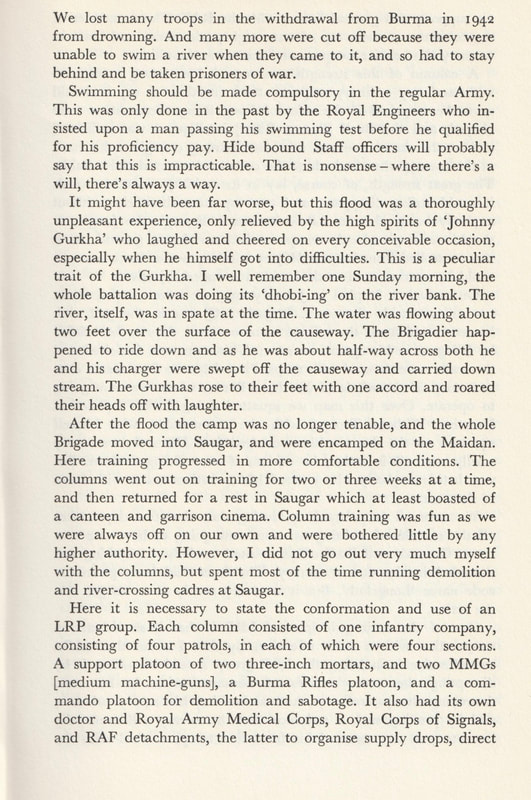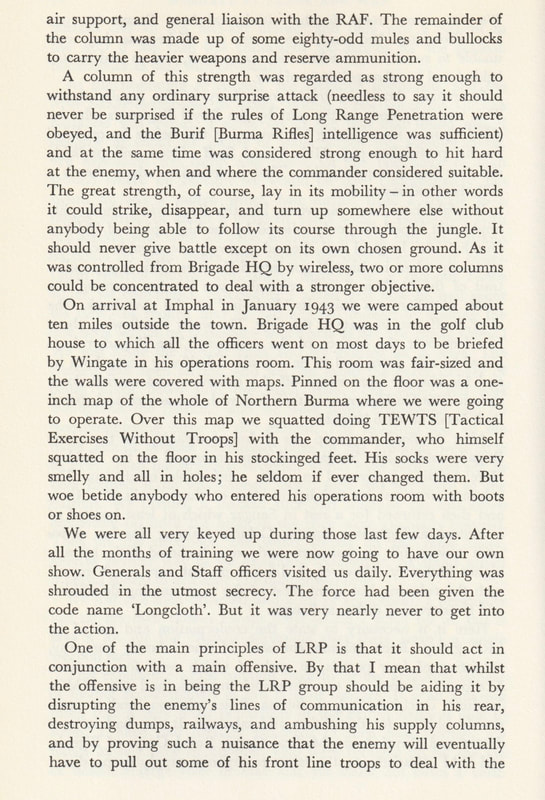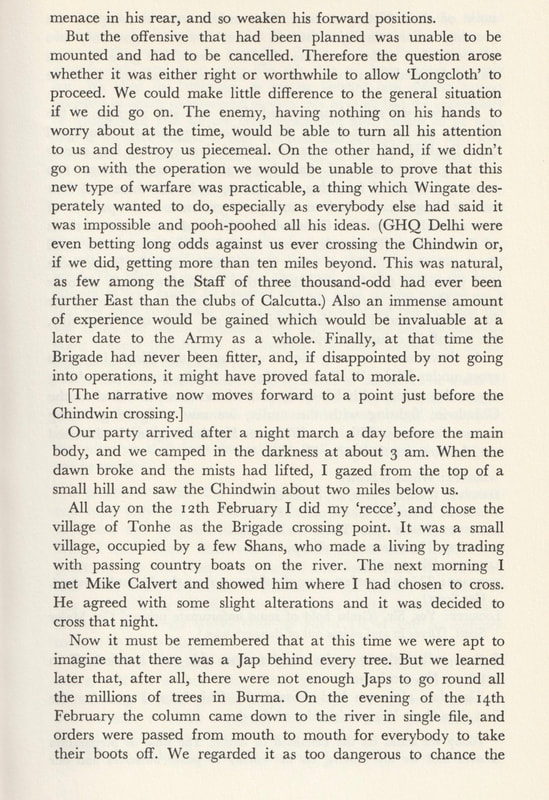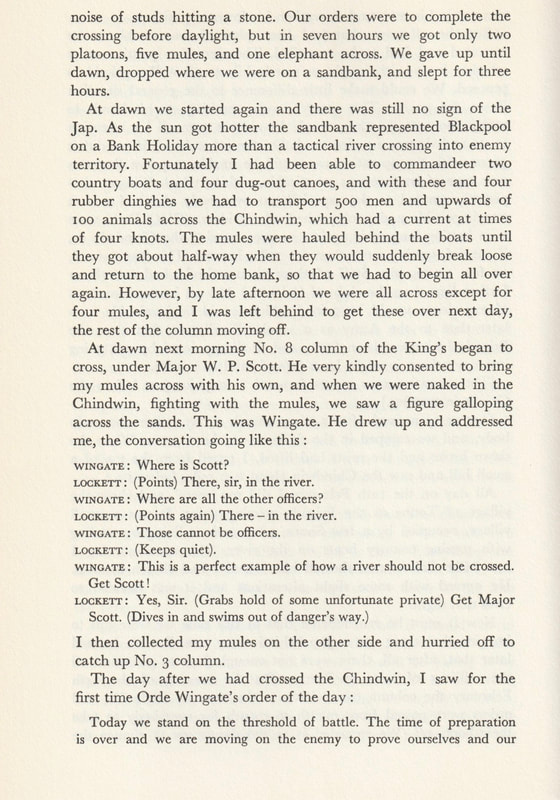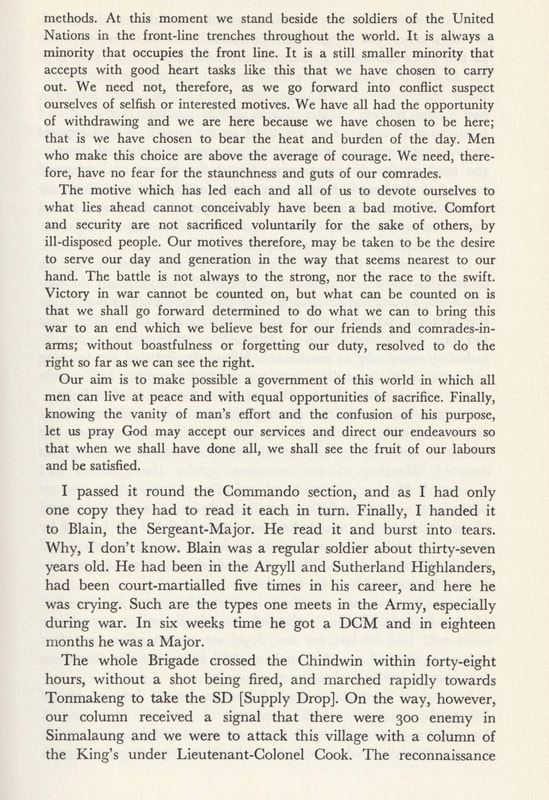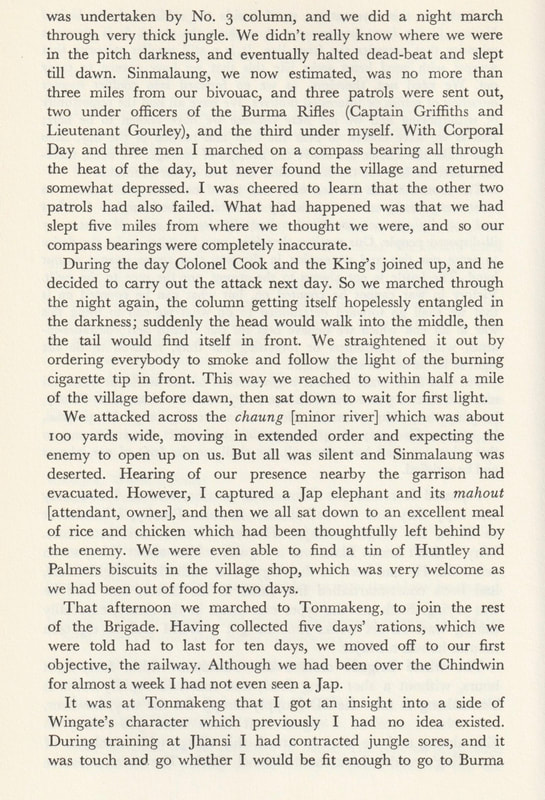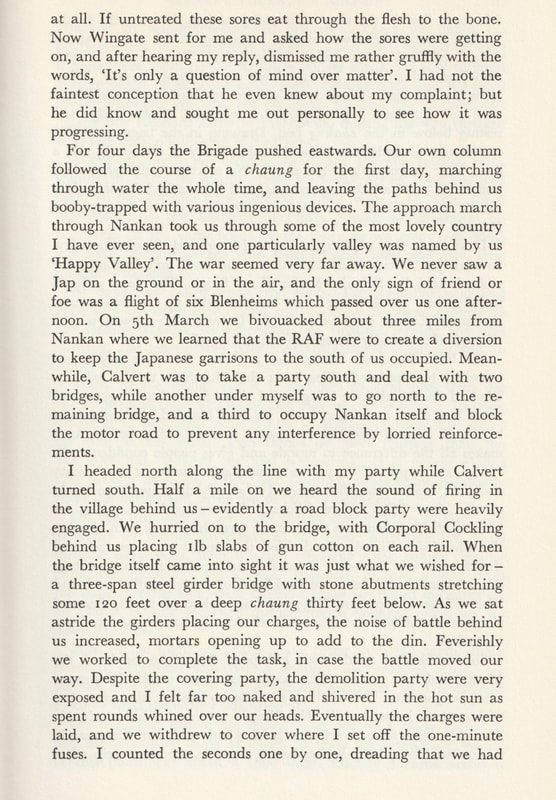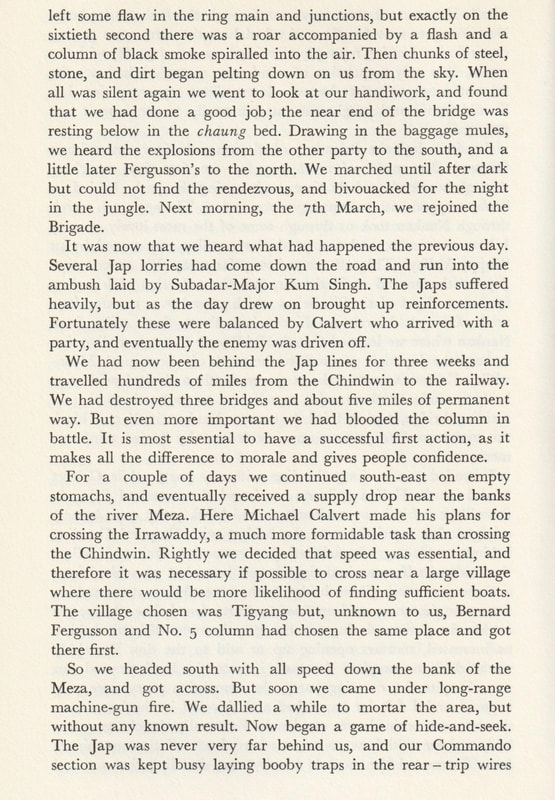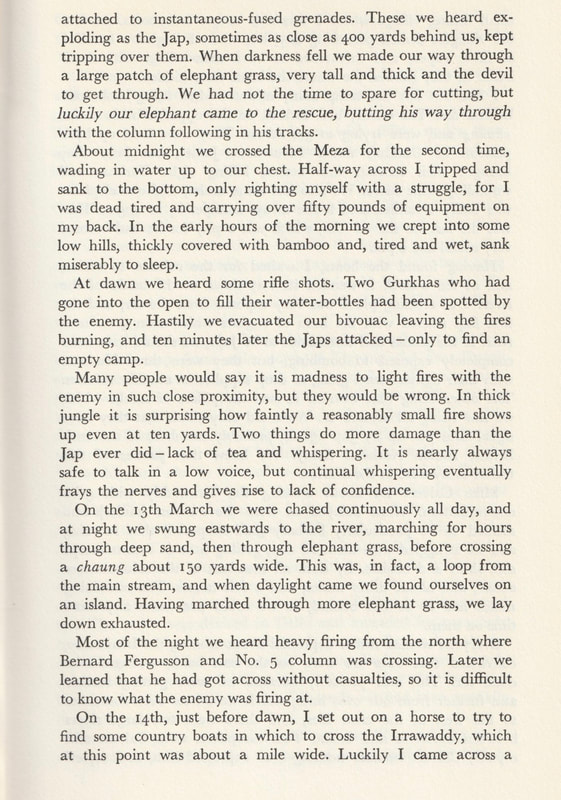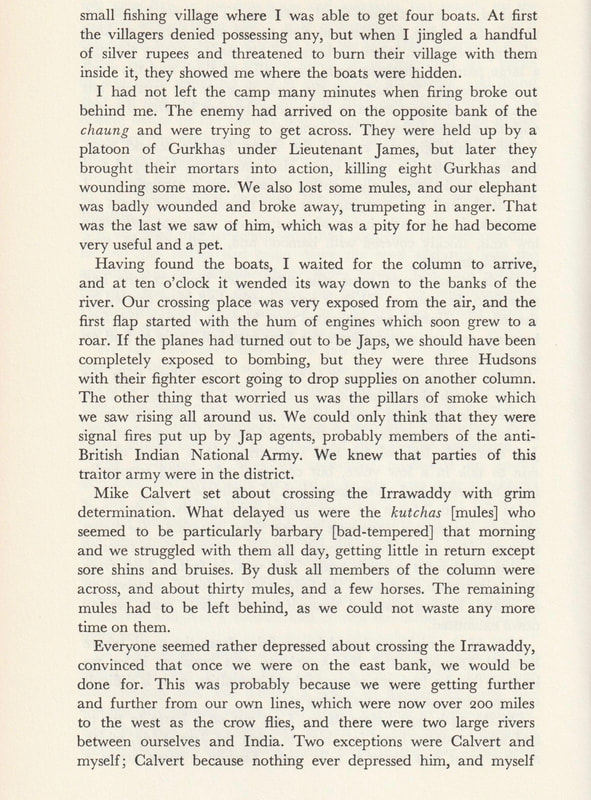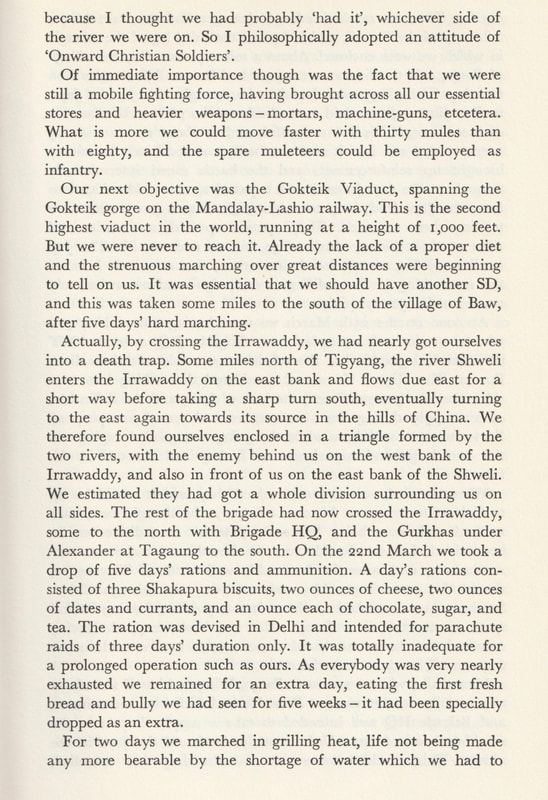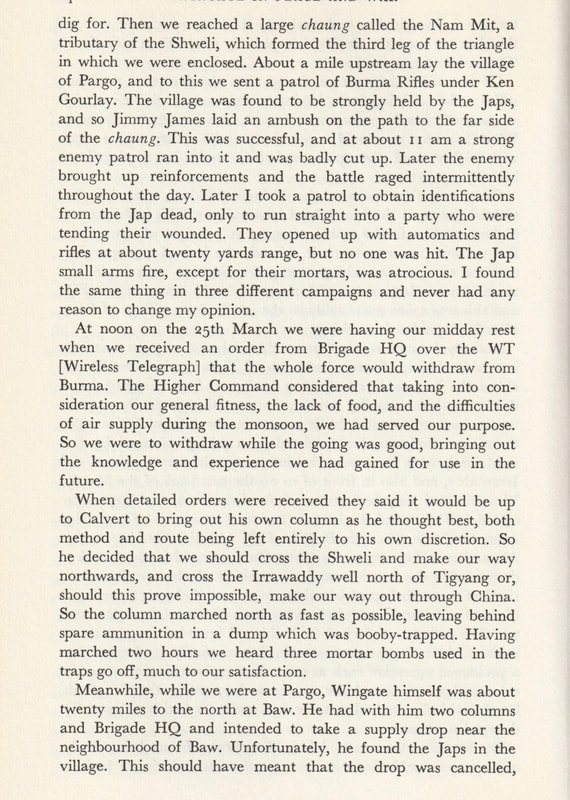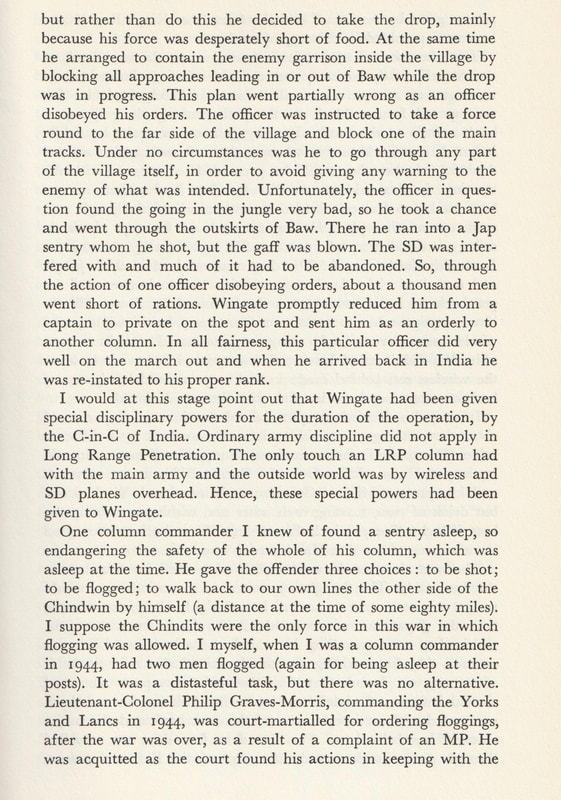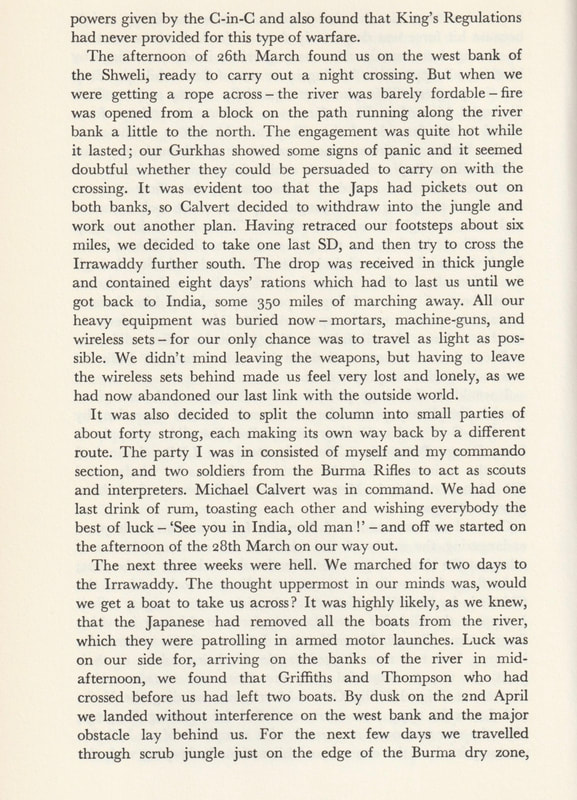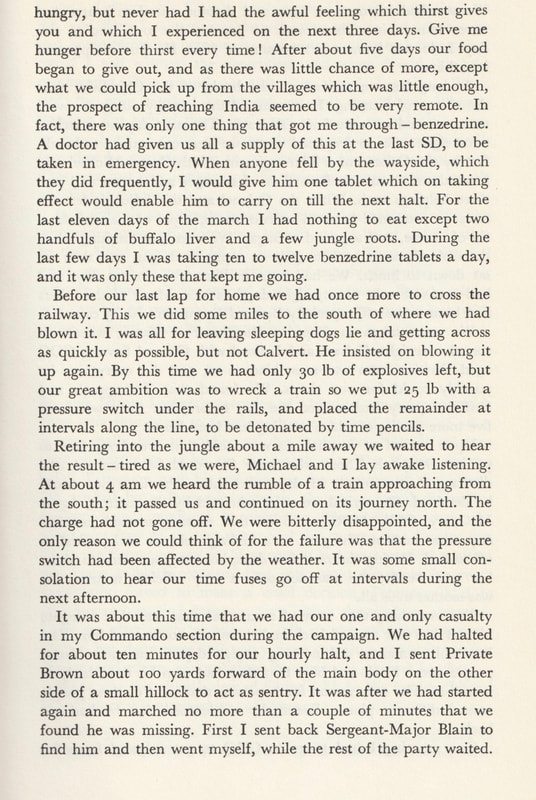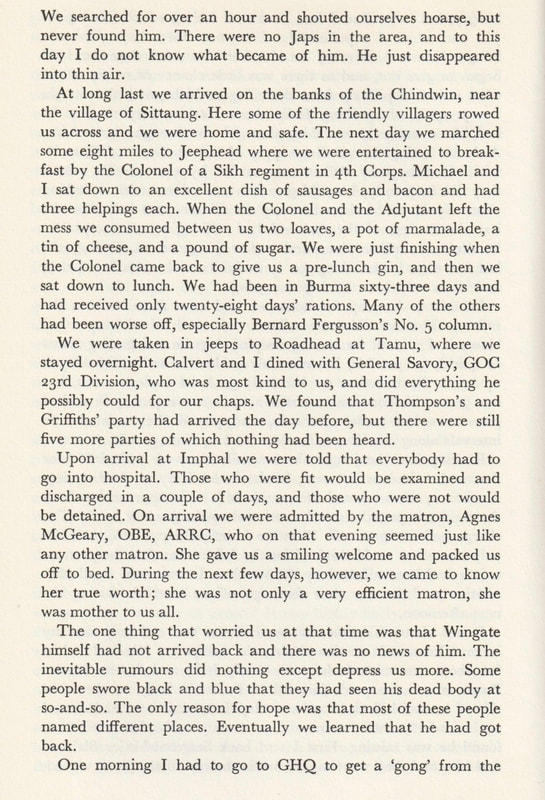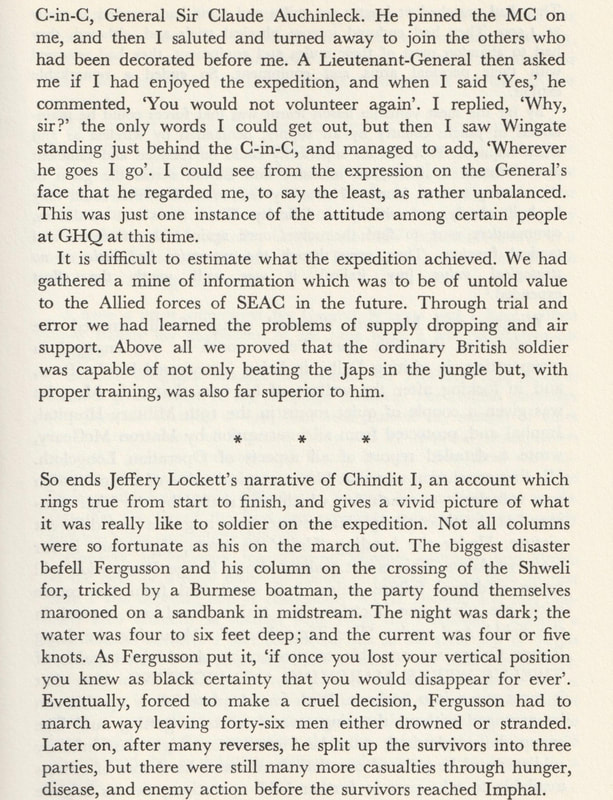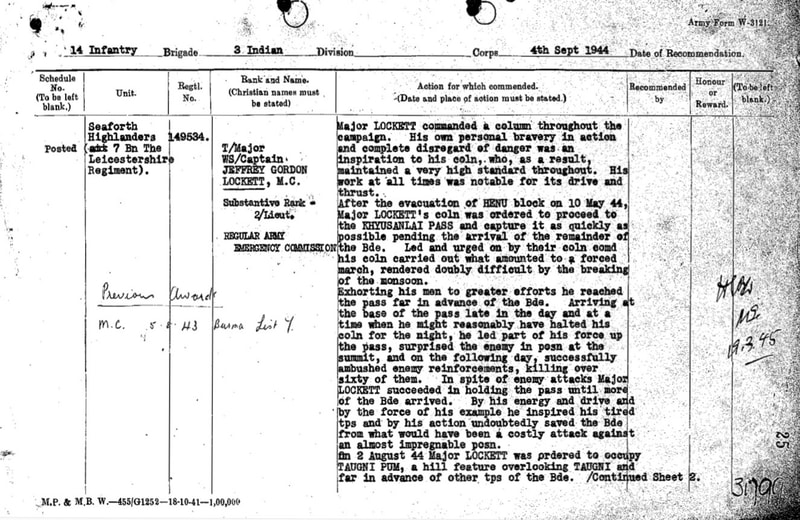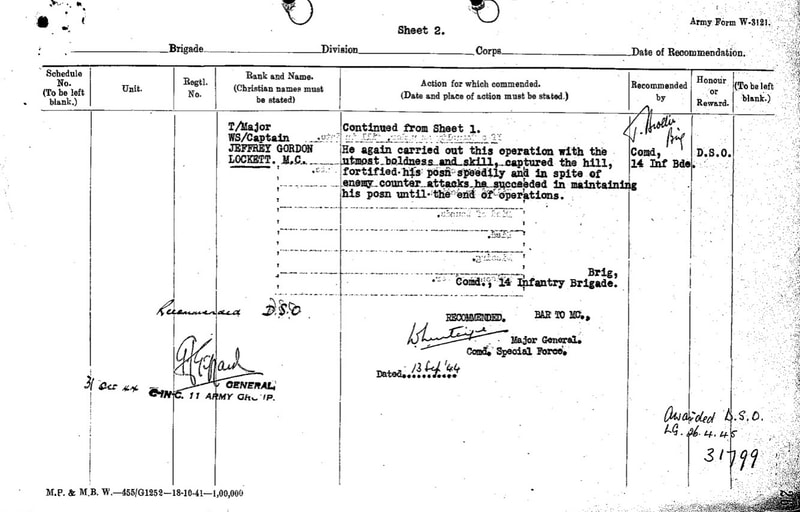Lt. Jeffrey Gordon Lockett (The Toothless Kilted Wonder).
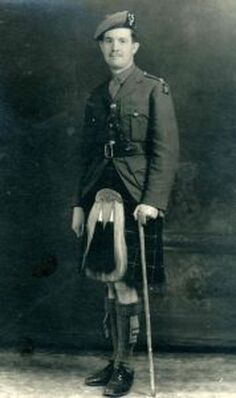 Jeffrey Gordon Lockett in 1941.
Jeffrey Gordon Lockett in 1941.
Jeffrey Lockett was the Commando Platoon commander for No. 3 Column on Operation Longcloth and was one of the great characters to emerge from the first Wingate expedition in 1943. As already stated in the title of this story, this former Wine Merchant from Liverpool made a very great impression upon the men he led and was known affectionately as the Toothless, Kilted Wonder.
Jeffrey Lockett was born on the 11th November 1913, and was the son of Gordon and Helen Lockett from the Wirral area of Liverpool and became a successful Wine Merchant in the city. He served as a Gunner in a Territorial Army (Royal Artillery) unit from 2nd September 1939 until 31st May 1940, when he began officer training at the 162 OCTU (Lanark).
He was commissioned into The Seaforth Highlanders with the Army no. 149534 on 27th September 1940, serving in 5th Battalion at Lythe in North Yorkshire until early August 1941. The photograph to the left shows him as a 2nd Lieutenant with the Seaforth's. He served with No. 4 Commando at Troon in Ayrshire until May 1942, whereafter he was posted to India.
Jeffrey, now with the rank of Acting Captain was taken on strength with 142 Commando (77 Brigade) on the 12th September 1942 and became the senior officer for No. 3 Column Commando Platoon at the Saugor training camp a few days later. The platoon was made up from soldiers with commando experience and some Royal Engineers. Lockett was the only officer in the platoon, alongside one Sergeant, one Corporal, two Lance Corporals and 12 Privates or Sappers. No. 3 Column was commanded on Operation Longcloth by Major Mike Calvert, himself and officer from the Royal Engineers with a vast experience in commando tactics.
During the arduous training at Saugor, the Chindits were taught the many aspects of Long Range Penetration, which included watermanship and rivercraft. On the 27th July 1942, the river used by the Chindits for training purposes, the Sunar was in full spate and several men got into difficulties on that day. Captain Lockett was involved in rescuing one man on the 27th and was subsequently awarded a Royal Humane Society Vellum Certificate. The inscription read:
Lt. Jeffrey G. Lockett of the Seaforth Highlanders is justly entitled to the Honorary Testimonial of this Society, which is hereby awarded to him for having, on the 27th July 1942, gone to the rescue of a man who was in imminent danger of drowning in the River Sunar at Patharia, in the Central Provinces of India, and whose life he gallantly assisted to save.
Sadly, several men did perish in the river that day, including Colour Sergeant Major George Bateman and Ptes. Harold Marsh and Francis McKibbin, all of the King's Regiment. To read more about this incident, please click on the following link: Men Who Died During Training
Before moving with this story about Jeffrey Lockett, I feel it is important for the reader to understand the nature of the man in question. Probably the best way to achieve this, is to read what other Chindits and commentators of the time had to say about him in early 1943. Firstly, from the book, Wingate's Raiders by Charles J. Rolo:
By far the wildest looking member of Wingate’s men was Jeffrey Lockett, a former Liverpool wine merchant, referred to among the Chindits as the toothless, kilted wonder. Before starting out in Burma Lockett had all his front teeth pulled out, grew an enormous beard, and, being a good Scotsman, insisted on fighting the campaign in a kilt. As a concession to local fashion he wore a cone-shaped Burmese coolie hat. In a tight corner he would pull a battered tin box out of his pocket and take a large pinch of snuff. Lockett's kilt, as a matter of fact, came in very handy. Calvert burrowed under it to shade his torch when reading maps at night, and other officers used it as a wind-shield to light matches under, until Lockett was burned in a tender spot and announced that hereafter match-lighting under his skirt was verboten.
There was also an amusing story that, after one particular supply drop, Lockett could not find any sign of his requested snuff, fresh kilt and false teeth. At the same time the Gurkha troops had been eagerly awaiting new supplies of curry powder to spice up their paltry rice ration. It was soon discovered to the distain of Lockett and Gurkha alike, that his snuff had been used in their cooking pot with very unpalatable results.
In New Delhi Lockett's appearance caused rage and consternation among the retired military and their memsahibs. Flight-Lieutenant Robert Thompson heard one woman exclaim as he and Lockett entered the bar of Maiden's Hotel, "Who on earth is that extraordinary man? Sometimes he has teeth, sometimes he hasn't, and he's always taking snuff. I don't object to that so much, but he drops it all over his moustache. How disgusting!" To which a vintage brass-hat added with a snort, "What a very odd type of young man seems to get commissioned these days."
During the training period Lockett formed the Tonga Club; the tonga is a native carriage well patronised by retired Generals short of wind and afflicted with gout. The members of the Tonga Club met to discuss what they would do when they became retired Generals. They agreed, among other things, to hold bath-chair races and to see to it that commissions went only to "a very odd type of young man." One of the alumni of the club later confessed: "We longed for civilisation so much that we had to thumb our noses at it." Behind Lockett's freakish antics and eccentric façade was a determined soldier and a brilliant officer. He had risen from the ranks, had been commissioned in the Seaforth Highlanders, and then had served with No. 4 Commando. For his exploits during the Wingate expedition he was awarded the Military Cross.
In his book about his Army career, Fighting Mad, Mike Calvert had these recollections of Jeffrey Lockett:
I remember on our way back out to India in 1943, I took with me the cooks, orderlies and other administrative chaps and our commando platoon, which was commanded by a young Scot, Jeffrey Lockett, a man after my own heart. Jeffrey, who had been a wine merchant before the war, had to have most of his teeth out just before we went into Burma, and he added to the rather grotesque effect of this by growing a wispy beard. Also, he always insisted on wearing the kilt, in the jungle or out of it. He was quite fearless and the sight of this toothless, bearded and kilted Scot charging at them with blazing eyes must have put the fear of God into many a Jap.
With Jeffrey and the rest of my party on dispersal, I set off south again in the hope of drawing away some of the Japs while the other parties of the column got out of the area. Finally we turned north-westward and after slipping across the Irrawaddy without being challenged, reached the railway at a spot some way to the south of Nankan, the scene of our earlier demolitions. I still had some explosives with me and decided to use them here to draw the Japs and help the other chaps. The enemy were being very careful about the railway line now and we knew there were Japs not far away, but I reckoned we could do our job quickly and slip off in the darkness without being caught.
I took Jeffrey with me and we laid the charges; then I felt for my time pencils, which would set them off after we had left. These pencils were in various colours, each colour representing a different length of time between setting the charge and the explosion. I had a strict rule that before a demolition party went out they should sort out their pencils and nick them with a knife, so many nicks to each colour, so that they would be easy to pick out even at night. It was an excellent rule, but that night I had forgotten to obey it myself. I sat on the railway embankment with Jeffrey and felt myself breaking out in a cold sweat as I realised what I had done, or rather what I had not done.
To make matters worse some of the lookouts had just reported that a group of Japs were close by; they were an engineer working party building a bridge.`What the hell do we do now?' I whispered urgently to Jeffrey. He was completely unruffled by the awkward situation. 'Better light a match and see what we're doing,' he said. I wouldn't have put it past him to show his contempt for the Japs by striking a match without any cover, but I had no intention of doing this. I looked round in the dim light for a bush big enough to provide a shield, but the banks had been cleared of thick scrub. Suddenly I found the answer to the problem.`Lift up that kilt of yours,' I said, grabbing a handful of time pencils and the matches. Even Jeffrey looked startled at this. 'Here, be careful,' he said. `Watch what you're doing with those things.' The thick folds of the kilt, held close to the ground, proved a first-class black-out curtain. I quickly sorted out the pencils I wanted while Jeffrey muttered away darkly about suing me for damages.
We then crept silently down to the track, set our charges and retreated rapidly to join the rest of the party. We moved off at once, west again towards the Chindwin, for the Japs would be looking for us very shortly and I wanted to make the most of the time the pencils were giving us. Later we heard the distant but gratifying explosions behind us. Jeffrey, walking by my side, chuckled into his beard and I knew that here was a man who would make his mark in the jungle war. We marched on and it came to me that although I was on my way out of Burma once more, I was feeling much happier about it than I had done the last time in 1942. This was not a retreat from defeat, but a withdrawal to renew our strength after a successful attacking mission. We had shown that we could play the Japs at their own game and beat them. A long trek lay ahead of us and almost certainly I would be swimming the Chindwin again at the end of it. But my spirits were high, for we had ventured and we had won.
Jeffrey Lockett was born on the 11th November 1913, and was the son of Gordon and Helen Lockett from the Wirral area of Liverpool and became a successful Wine Merchant in the city. He served as a Gunner in a Territorial Army (Royal Artillery) unit from 2nd September 1939 until 31st May 1940, when he began officer training at the 162 OCTU (Lanark).
He was commissioned into The Seaforth Highlanders with the Army no. 149534 on 27th September 1940, serving in 5th Battalion at Lythe in North Yorkshire until early August 1941. The photograph to the left shows him as a 2nd Lieutenant with the Seaforth's. He served with No. 4 Commando at Troon in Ayrshire until May 1942, whereafter he was posted to India.
Jeffrey, now with the rank of Acting Captain was taken on strength with 142 Commando (77 Brigade) on the 12th September 1942 and became the senior officer for No. 3 Column Commando Platoon at the Saugor training camp a few days later. The platoon was made up from soldiers with commando experience and some Royal Engineers. Lockett was the only officer in the platoon, alongside one Sergeant, one Corporal, two Lance Corporals and 12 Privates or Sappers. No. 3 Column was commanded on Operation Longcloth by Major Mike Calvert, himself and officer from the Royal Engineers with a vast experience in commando tactics.
During the arduous training at Saugor, the Chindits were taught the many aspects of Long Range Penetration, which included watermanship and rivercraft. On the 27th July 1942, the river used by the Chindits for training purposes, the Sunar was in full spate and several men got into difficulties on that day. Captain Lockett was involved in rescuing one man on the 27th and was subsequently awarded a Royal Humane Society Vellum Certificate. The inscription read:
Lt. Jeffrey G. Lockett of the Seaforth Highlanders is justly entitled to the Honorary Testimonial of this Society, which is hereby awarded to him for having, on the 27th July 1942, gone to the rescue of a man who was in imminent danger of drowning in the River Sunar at Patharia, in the Central Provinces of India, and whose life he gallantly assisted to save.
Sadly, several men did perish in the river that day, including Colour Sergeant Major George Bateman and Ptes. Harold Marsh and Francis McKibbin, all of the King's Regiment. To read more about this incident, please click on the following link: Men Who Died During Training
Before moving with this story about Jeffrey Lockett, I feel it is important for the reader to understand the nature of the man in question. Probably the best way to achieve this, is to read what other Chindits and commentators of the time had to say about him in early 1943. Firstly, from the book, Wingate's Raiders by Charles J. Rolo:
By far the wildest looking member of Wingate’s men was Jeffrey Lockett, a former Liverpool wine merchant, referred to among the Chindits as the toothless, kilted wonder. Before starting out in Burma Lockett had all his front teeth pulled out, grew an enormous beard, and, being a good Scotsman, insisted on fighting the campaign in a kilt. As a concession to local fashion he wore a cone-shaped Burmese coolie hat. In a tight corner he would pull a battered tin box out of his pocket and take a large pinch of snuff. Lockett's kilt, as a matter of fact, came in very handy. Calvert burrowed under it to shade his torch when reading maps at night, and other officers used it as a wind-shield to light matches under, until Lockett was burned in a tender spot and announced that hereafter match-lighting under his skirt was verboten.
There was also an amusing story that, after one particular supply drop, Lockett could not find any sign of his requested snuff, fresh kilt and false teeth. At the same time the Gurkha troops had been eagerly awaiting new supplies of curry powder to spice up their paltry rice ration. It was soon discovered to the distain of Lockett and Gurkha alike, that his snuff had been used in their cooking pot with very unpalatable results.
In New Delhi Lockett's appearance caused rage and consternation among the retired military and their memsahibs. Flight-Lieutenant Robert Thompson heard one woman exclaim as he and Lockett entered the bar of Maiden's Hotel, "Who on earth is that extraordinary man? Sometimes he has teeth, sometimes he hasn't, and he's always taking snuff. I don't object to that so much, but he drops it all over his moustache. How disgusting!" To which a vintage brass-hat added with a snort, "What a very odd type of young man seems to get commissioned these days."
During the training period Lockett formed the Tonga Club; the tonga is a native carriage well patronised by retired Generals short of wind and afflicted with gout. The members of the Tonga Club met to discuss what they would do when they became retired Generals. They agreed, among other things, to hold bath-chair races and to see to it that commissions went only to "a very odd type of young man." One of the alumni of the club later confessed: "We longed for civilisation so much that we had to thumb our noses at it." Behind Lockett's freakish antics and eccentric façade was a determined soldier and a brilliant officer. He had risen from the ranks, had been commissioned in the Seaforth Highlanders, and then had served with No. 4 Commando. For his exploits during the Wingate expedition he was awarded the Military Cross.
In his book about his Army career, Fighting Mad, Mike Calvert had these recollections of Jeffrey Lockett:
I remember on our way back out to India in 1943, I took with me the cooks, orderlies and other administrative chaps and our commando platoon, which was commanded by a young Scot, Jeffrey Lockett, a man after my own heart. Jeffrey, who had been a wine merchant before the war, had to have most of his teeth out just before we went into Burma, and he added to the rather grotesque effect of this by growing a wispy beard. Also, he always insisted on wearing the kilt, in the jungle or out of it. He was quite fearless and the sight of this toothless, bearded and kilted Scot charging at them with blazing eyes must have put the fear of God into many a Jap.
With Jeffrey and the rest of my party on dispersal, I set off south again in the hope of drawing away some of the Japs while the other parties of the column got out of the area. Finally we turned north-westward and after slipping across the Irrawaddy without being challenged, reached the railway at a spot some way to the south of Nankan, the scene of our earlier demolitions. I still had some explosives with me and decided to use them here to draw the Japs and help the other chaps. The enemy were being very careful about the railway line now and we knew there were Japs not far away, but I reckoned we could do our job quickly and slip off in the darkness without being caught.
I took Jeffrey with me and we laid the charges; then I felt for my time pencils, which would set them off after we had left. These pencils were in various colours, each colour representing a different length of time between setting the charge and the explosion. I had a strict rule that before a demolition party went out they should sort out their pencils and nick them with a knife, so many nicks to each colour, so that they would be easy to pick out even at night. It was an excellent rule, but that night I had forgotten to obey it myself. I sat on the railway embankment with Jeffrey and felt myself breaking out in a cold sweat as I realised what I had done, or rather what I had not done.
To make matters worse some of the lookouts had just reported that a group of Japs were close by; they were an engineer working party building a bridge.`What the hell do we do now?' I whispered urgently to Jeffrey. He was completely unruffled by the awkward situation. 'Better light a match and see what we're doing,' he said. I wouldn't have put it past him to show his contempt for the Japs by striking a match without any cover, but I had no intention of doing this. I looked round in the dim light for a bush big enough to provide a shield, but the banks had been cleared of thick scrub. Suddenly I found the answer to the problem.`Lift up that kilt of yours,' I said, grabbing a handful of time pencils and the matches. Even Jeffrey looked startled at this. 'Here, be careful,' he said. `Watch what you're doing with those things.' The thick folds of the kilt, held close to the ground, proved a first-class black-out curtain. I quickly sorted out the pencils I wanted while Jeffrey muttered away darkly about suing me for damages.
We then crept silently down to the track, set our charges and retreated rapidly to join the rest of the party. We moved off at once, west again towards the Chindwin, for the Japs would be looking for us very shortly and I wanted to make the most of the time the pencils were giving us. Later we heard the distant but gratifying explosions behind us. Jeffrey, walking by my side, chuckled into his beard and I knew that here was a man who would make his mark in the jungle war. We marched on and it came to me that although I was on my way out of Burma once more, I was feeling much happier about it than I had done the last time in 1942. This was not a retreat from defeat, but a withdrawal to renew our strength after a successful attacking mission. We had shown that we could play the Japs at their own game and beat them. A long trek lay ahead of us and almost certainly I would be swimming the Chindwin again at the end of it. But my spirits were high, for we had ventured and we had won.
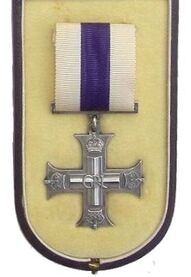 The Military Cross medal.
The Military Cross medal.
As previously mentioned, for his efforts on Operation Longcloth, Jeffrey Lockett was awarded the Military Cross. Seen below is a transcription of the official recommendation for this award, as written out by Major Calvert after No. 3 Column's return to India:
Lieutenant (Acting Captain) Jeffrey Gordon Lockett
Action for which recommended:
OPERATIONS IN BURMA - MARCH 1943
This officer commanded the Commando Platoon of No. 3 Column throughout the operation. His report on the work of his squad is an appendix (see gallery below) to the official report of the operations for 1943. Of all the Commando Squads in the Brigade, Lt. Lockett's achieved the greatest results and this was largely due to the personal courage and initiative of Lockett and his men who were inspired by his example.
When making the main attack on the railway in the Nankan area on March 6th, Lockett carried out his work of demolishing four important bridges and the destruction of the line itself in over 75 places, coolly and calmly in spite of the fact that a battle was taking place in his immediate neighbourhood. Throughout subsequent engagements Lt. Lockett commanded his Commando Squad with skill and courage giving a personal example of unselfishness and quick and intelligent obedience to the orders of his commander.
Recommended By: Major J.M. Calvert DSO (Royal Engineers).
Award of the Military Cross (Immediate).
Signed by: Brigadier O.C. Wingate, DSO
Commander 77th Indian Infantry Brigade.
London Gazette 5th August 1943.
To read more about the demolitions at Nankan and the extraordinary performance of No. 3 Column and the Commando Platoon, please click on the following link: Sergeant-Major Robert Blain
In the gallery shown below is the complete debrief document written by Jeffrey Lockett after Operation Longcloth, this forms part of the full operational report put together for the first Wingate expedition in 1943. Please click on each image to bring it forward on the page and apologies for the quality of the photographs.
Lieutenant (Acting Captain) Jeffrey Gordon Lockett
Action for which recommended:
OPERATIONS IN BURMA - MARCH 1943
This officer commanded the Commando Platoon of No. 3 Column throughout the operation. His report on the work of his squad is an appendix (see gallery below) to the official report of the operations for 1943. Of all the Commando Squads in the Brigade, Lt. Lockett's achieved the greatest results and this was largely due to the personal courage and initiative of Lockett and his men who were inspired by his example.
When making the main attack on the railway in the Nankan area on March 6th, Lockett carried out his work of demolishing four important bridges and the destruction of the line itself in over 75 places, coolly and calmly in spite of the fact that a battle was taking place in his immediate neighbourhood. Throughout subsequent engagements Lt. Lockett commanded his Commando Squad with skill and courage giving a personal example of unselfishness and quick and intelligent obedience to the orders of his commander.
Recommended By: Major J.M. Calvert DSO (Royal Engineers).
Award of the Military Cross (Immediate).
Signed by: Brigadier O.C. Wingate, DSO
Commander 77th Indian Infantry Brigade.
London Gazette 5th August 1943.
To read more about the demolitions at Nankan and the extraordinary performance of No. 3 Column and the Commando Platoon, please click on the following link: Sergeant-Major Robert Blain
In the gallery shown below is the complete debrief document written by Jeffrey Lockett after Operation Longcloth, this forms part of the full operational report put together for the first Wingate expedition in 1943. Please click on each image to bring it forward on the page and apologies for the quality of the photographs.
Jeffrey Lockett, now with the temporary rank of Major, went into Burma again in 1944. He was given the command of No. 74 Column (7th Leicester's) after the previous commander, James Wileman was taken ill with dysentery. In the battalion's WW2 History it states:
Major Lockett came to us as an unknown quantity, but this obscurity did not last for very long. He persisted in wearing a Victorian pith helmet as favoured in 1943 by Wingate himself and frequently appeared with his regimental kilt slung around his shoulders, the sleeves of his bush jacket flapping loose and the laces of his boots undone. After we disbanded in late 1944, he went off to Chakala and became a parachutist and did some very top secret work in enemy-occupied Siam. For this he was awarded a Bar to the DSO he won with us on Operation Thursday.
The 7th Leicester's columns, nos. 47 & 74 formed one quarter of the 14th British Infantry Brigade (Chindits), which came into Burma during the second wave of Operation Thursday. As mentioned above, Major Lockett was awarded the Distinguished Service Order for his contribution on the second Wingate expedition in 1944:
Major Lockett came to us as an unknown quantity, but this obscurity did not last for very long. He persisted in wearing a Victorian pith helmet as favoured in 1943 by Wingate himself and frequently appeared with his regimental kilt slung around his shoulders, the sleeves of his bush jacket flapping loose and the laces of his boots undone. After we disbanded in late 1944, he went off to Chakala and became a parachutist and did some very top secret work in enemy-occupied Siam. For this he was awarded a Bar to the DSO he won with us on Operation Thursday.
The 7th Leicester's columns, nos. 47 & 74 formed one quarter of the 14th British Infantry Brigade (Chindits), which came into Burma during the second wave of Operation Thursday. As mentioned above, Major Lockett was awarded the Distinguished Service Order for his contribution on the second Wingate expedition in 1944:
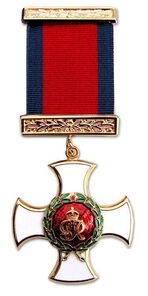 The DSO medal.
The DSO medal.
Transcript of the Distinguished Service Order Citation
Brigade-14th British Infantry
Division-3rd Indian
Unit-Seaforth Highlanders att. 7th Battalion The Leicestershire Regiment
Date of Recommendation-4th September 1944
Regimental No.-149534
Rank and Name:
Major (temporary) Jeffrey Gordon Lockett M.C.
Action for which recommended:
Major Lockett commanded a column (No. 74) throughout the campaign. His own personal bravery in action and complete disregard of danger was an inspiration to his column, who, as a result, maintained a very high standard throughout. His work at all times was notable for its drive and thrust.
After the evacuation of Henu Block (White City) on 10th May 1944, Major Locketts’ column was ordered to proceed to the Kyusunlai Pass and capture it as quickly as possible pending the arrival of the remainder of the Brigade. Led and urged on by their commander his column carried out what amounted to a forced march, rendered doubly difficult by the breaking monsoon.
Exhorting his men to greater efforts, he reached the pass far in advance of the Brigade. Arriving at the base of the pass late in the day and at a time when he might reasonably have halted his column for the night, he led part of his force up the pass, surprised the enemy position at the summit, and on the following day, successfully ambushed enemy reinforcements, killing over sixty of them. In spite of several enemy attacks, Major Lockett succeeded in holding the pass until more of the Brigade arrived. By his energy and drive and by the force of his example he inspired his tired troops, and by his action undoubtedly saved the Brigade from what would have been a costly attack against an almost impregnable position.
On 2nd August 1944, Major Lockett was ordered to occupy Taugni Pum, a hill feature overlooking Taugni and far in advance of other troops of the Brigade. He again carried out this operation with the utmost boldness and skill, captured the hill, fortified his position speedily and in spite of enemy counter attacks he succeeded in maintaining his position until the end of operations.
Recommended By: Brigadier T. Brodie, Commander 14th British Infantry Brigade
Honour or Reward: Distinguished Service Order
Signed By: Major General W.D.A. Lentaigne
Commander 3rd Indian Division
London Gazette 26th April 1945.
Brigade-14th British Infantry
Division-3rd Indian
Unit-Seaforth Highlanders att. 7th Battalion The Leicestershire Regiment
Date of Recommendation-4th September 1944
Regimental No.-149534
Rank and Name:
Major (temporary) Jeffrey Gordon Lockett M.C.
Action for which recommended:
Major Lockett commanded a column (No. 74) throughout the campaign. His own personal bravery in action and complete disregard of danger was an inspiration to his column, who, as a result, maintained a very high standard throughout. His work at all times was notable for its drive and thrust.
After the evacuation of Henu Block (White City) on 10th May 1944, Major Locketts’ column was ordered to proceed to the Kyusunlai Pass and capture it as quickly as possible pending the arrival of the remainder of the Brigade. Led and urged on by their commander his column carried out what amounted to a forced march, rendered doubly difficult by the breaking monsoon.
Exhorting his men to greater efforts, he reached the pass far in advance of the Brigade. Arriving at the base of the pass late in the day and at a time when he might reasonably have halted his column for the night, he led part of his force up the pass, surprised the enemy position at the summit, and on the following day, successfully ambushed enemy reinforcements, killing over sixty of them. In spite of several enemy attacks, Major Lockett succeeded in holding the pass until more of the Brigade arrived. By his energy and drive and by the force of his example he inspired his tired troops, and by his action undoubtedly saved the Brigade from what would have been a costly attack against an almost impregnable position.
On 2nd August 1944, Major Lockett was ordered to occupy Taugni Pum, a hill feature overlooking Taugni and far in advance of other troops of the Brigade. He again carried out this operation with the utmost boldness and skill, captured the hill, fortified his position speedily and in spite of enemy counter attacks he succeeded in maintaining his position until the end of operations.
Recommended By: Brigadier T. Brodie, Commander 14th British Infantry Brigade
Honour or Reward: Distinguished Service Order
Signed By: Major General W.D.A. Lentaigne
Commander 3rd Indian Division
London Gazette 26th April 1945.
The award of the DSO was recorded in the Liverpool Echo newspaper on Friday 27th April 1945:
Kilt and Beard in Burma Wilds
The kilted Lieutenant, Jeffrey Gordon Lockett, a Director of the General Merchants on Exchange Street in Liverpool has been awarded the Distinguished Service Order for his services in Burma on the second Wingate expedition. Major Lockett, whose home is The Old Vicarage, Eastham, is an old Harrovian and in civil life was a member of the Liverpool firm of James Platt and Company.
He began his Army career as a Territorial with a local AA Battery in 1939 and twelve months later went to an O.C.T.U. gaining a commission to the Seaforth Highlanders. He later transferred to the Commandos and was posted out to India. In 1943 he was awarded the Military Cross for his efforts on the first Wingate expedition. Another correspondent from this newspaper wrote of him: He was the strangest sight you ever saw. He always wore a kilt, grew an enormous beard and was more than enough to frighten any Jap.
Kilt and Beard in Burma Wilds
The kilted Lieutenant, Jeffrey Gordon Lockett, a Director of the General Merchants on Exchange Street in Liverpool has been awarded the Distinguished Service Order for his services in Burma on the second Wingate expedition. Major Lockett, whose home is The Old Vicarage, Eastham, is an old Harrovian and in civil life was a member of the Liverpool firm of James Platt and Company.
He began his Army career as a Territorial with a local AA Battery in 1939 and twelve months later went to an O.C.T.U. gaining a commission to the Seaforth Highlanders. He later transferred to the Commandos and was posted out to India. In 1943 he was awarded the Military Cross for his efforts on the first Wingate expedition. Another correspondent from this newspaper wrote of him: He was the strangest sight you ever saw. He always wore a kilt, grew an enormous beard and was more than enough to frighten any Jap.
As mentioned in the 7th Leicester's history, Jeffrey Lockett went on to join the parachute battalions which were being raised in India from soldiers who had previously served with the Chindits on Operation Thursday. After the 2nd and 7th battalions of the Leicestershire Regiment were amalgamated post Operation Thursday, Lockett was transferred to the 1st Battalion of the King's Regiment and began SOE (Special Operations Executive) training on the 20th February 1945.
He undertook several missions in southern Burma and northern Thailand, parachuting into these areas to reconnoitre Japanese positions. After dropping into the Karenni Hills in the spring of 1945, Lockett was involved in accessing the area for the presence of reported Allied POW camps, but none were found. Being unable to return to base, he remained in the general location and worked with the Force 136 unit based there. After the war he served for a while with the Arab Legion alongside several other Chindit comrades and then with the SAS (Special Air Service), working once more with Mike Calvert in Malaya. Jeffrey Lockett retired from the Army on the 4th November 1953.
Seen below is gallery of images in relation to this story, including a copy of Jeffrey Lockett's award from the Royal Humane Society in regards to the rescue of the drowning Chindit in the Sunar River at Patharia on the 27th July 1942. Please click on any image to bring it forward on the page.
He undertook several missions in southern Burma and northern Thailand, parachuting into these areas to reconnoitre Japanese positions. After dropping into the Karenni Hills in the spring of 1945, Lockett was involved in accessing the area for the presence of reported Allied POW camps, but none were found. Being unable to return to base, he remained in the general location and worked with the Force 136 unit based there. After the war he served for a while with the Arab Legion alongside several other Chindit comrades and then with the SAS (Special Air Service), working once more with Mike Calvert in Malaya. Jeffrey Lockett retired from the Army on the 4th November 1953.
Seen below is gallery of images in relation to this story, including a copy of Jeffrey Lockett's award from the Royal Humane Society in regards to the rescue of the drowning Chindit in the Sunar River at Patharia on the 27th July 1942. Please click on any image to bring it forward on the page.
After the war Jeffrey Lockett was heavily involved with the Chindit Old Comrades Association, holding the post of Honorary Secretary for a period, including during the arrangements for the Chindit Rally held at St. Paul's Square (Liverpool) in March 1948. Sadly, Jeffrey Lockett died on the 20th February 1960 whilst living at Bulawayo in Rhodesia. He is buried at Karoi Cemetery, Chinhoyi, Mashonaland West, Zimbabwe.
Update 25/10/2020.
In the book, Wingate in Peace and War by Major-General Derek Tulloch, there is a twenty page narrative written by Jeffrey Lockett, describing his memories from Operation Longcloth. Seen below is a collection of these pages plus the official recommendation for Lockett's award of the Distinguished Service Order. Please click on any image to bring it forward on the page.
In the book, Wingate in Peace and War by Major-General Derek Tulloch, there is a twenty page narrative written by Jeffrey Lockett, describing his memories from Operation Longcloth. Seen below is a collection of these pages plus the official recommendation for Lockett's award of the Distinguished Service Order. Please click on any image to bring it forward on the page.
Copyright © Steve Fogden, February 2020.
